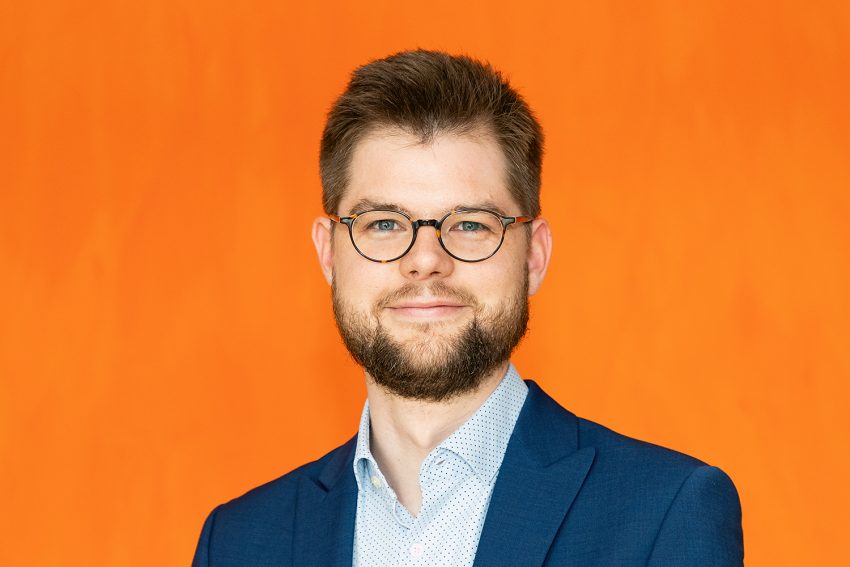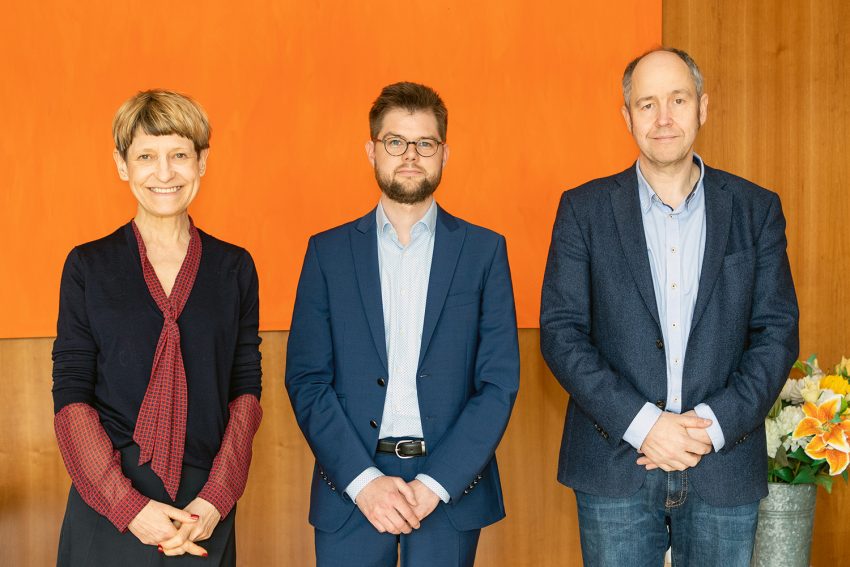Materials of the future: “Bio-based, efficient and sustainable” Oliver Völkerink is a new assistant professor at the Institute of Mechanics and Adaptronics
Oliver Völkerink’s fascination for lightweight construction was awakened in the Formula Student Team, a racing team of students at Technische Universität Braunschweig. Since May 2023, he has been back at TU Braunschweig as an assistant professor at the Institute of Mechanics and Adaptronics. He has brought with him his vision of lightweight and bio-based structural components that can be recycled and thus contribute to the circular economy. In the interview, he introduces himself and his research.
Prof. Völkerink, why did you choose TU Braunschweig?

Oliver Völkerink is the new assistant professor at the Institute of Mechanics and Adaptronics. Photo credit: Kristina Rottig/TU Braunschweig
I studied at TU Braunschweig and have fond memories of the university from a student’s perspective, but I also remained connected to it through collaborations during my time as a research associate at the DLR Institute of Lightweight Systems in Braunschweig. With the publication of the call for applications for the tenure-track professorship to which I have now been appointed, I have once again taken a closer look at the orientation of TU Braunschweig and in particular the Faculty of Mechanical Engineering from a research perspective.
What was attractive to me was the broad thematic positioning of research in mechanical engineering with the various research centres. The Open Hybrid LabFactory (OHLF) in Wolfsburg is a good example. The topics we work on at the Institute of Mechanics and Adaptronics are relevant to various industries, from pharmaceutical process engineering to aircraft construction to the automotive industry. All these areas are covered in the faculty. In addition, there is the dense network of non-university research institutions in the region. Furthermore, as a resident of Braunschweig, I feel very much at home in the city and am all the more pleased to be able to live here in the future.
What exactly do you deal with in your research?
My field of work is function integration in production engineering. Function integration describes the combination of several functions in the load path of a component, i.e. where forces are transmitted. To make this a little more vivid, I’ll give an example: a hanging lamp is attached to the ceiling with a chain and connected to the house’s power grid with an additional electric cable. The component chain takes over the function of load transmission and the electrical cable the function of energy transmission. If the electrical supply cable were designed in such a way that no additional chain is required and the lamp hangs directly from the cable, the two functions would be integrated in one component. In this way, one component, namely the chain, is saved, which in turn results in material and cost savings. The transfer of this principle to various issues, especially the integration of sensor technology, is the core of my work. Always accompanied by the question: How can I manufacture the functionally integrated component, but also disassemble and recycle it after operation?
What are the main research areas and projects you will be working on at TU Braunschweig?
My research focuses on sustainable and recyclable lightweight structures with integrated functional elements. Examples of these functional elements are crack-stop elements in multifunctional joints, but also sensors and electronics that are structurally integrated to monitor components in production and operation. The effects of these elements on the mechanical behaviour of the structure, but also on the functional performance itself, are investigated in physical experiments and with virtual tests in the form of numerical simulations. Another focus is on material characterisation and modelling in order to be able to map the different materials in the functional structures in simulations.

TU President Prof. Angela Ittel, Prof. Oliver Völkerink and Prof. Markus Böl, Dean of the Faculty of Mechanical Engineering (from left to right) Photo credit: Kristina Rottig/TU Braunschweig
What made you decide to do research in this area?
During my studies, I was part of the Formula Student team at TU Braunschweig. As part of the Formula Student competition, students build a new racing car every year with which they compete against teams from other universities and colleges. It was there that my fascination for lightweight construction was awakened, as lightweight racing cars are naturally faster and more energy-efficient than heavy ones and thus have a competitive advantage. At the same time, this is quite challenging, as a basic understanding of mechanics is required to design structures efficiently. In addition, during my scientific work so far, I have had the desire to research lightweight and high-performance structures that are sustainable at the same time. My vision is structural components made of bio-based materials, for example natural fibre-reinforced plastics, which are monitored with sensors during operation, so that they can be operated for as long as possible and repaired in a targeted manner if necessary. This would make it possible to keep the materials and components in the material cycle for as long as possible in the future, and in this way my research can contribute to a transformation from a linear to a circular economy.
What does your day-to-day work currently look like?
Right now, I’m mainly busy generating ideas for research proposals, discussing them with staff and putting them down on paper. I’m also already assisting the first students with their final theses and trying to recruit bright minds for future research projects. In addition, I am preparing the teaching for the coming winter semester.
Thank you very much for the interview.
